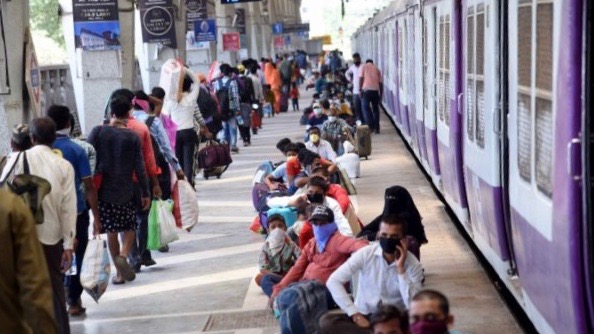At least 80 migrant workers in India have died between May 9 and May 27 on the Shramik (workers) special trains being run by the government to transport stranded workers back to their native towns and villages in different States in India. The workers were stuck for months in the cities where they work following the countrywide lockdown imposed by the Indian government on March 24.
This figure of the number of migrant deaths aboard the special trains was reported on May 30, Saturday by the daily, Hindustan Times, which has accessed data from the Railway Protection Force (RPF) – a security force established for the railways.
Quoting one of the RPF’s officials anonymously, the report clarified that this figure is as per “an initial list” and that the “final list will soon be issued after coordinating with the states”.
Also, data for deaths that may have occurred in the first eight days since these special trains were started on May 1 has not yet been made available. The service was started under popular pressure following a massive public outcry about the plight of the migrant workers under lockdown.
Due to the rushed and ill-planned lockdown, hundreds of thousands of migrant workers became stranded in cities far away from their hometowns, with no earning and little food to get by. Most of these workers are employed in the unorganized sector and lost all means of income once the lockdown was implemented. Out of desperation, tens of thousands set out on foot to cover the hundreds of kilometers back home.
Scores of migrants had died on the roads from hunger, exhaustion and in accidents by the time the railway service was started on May 1. And in these trains, more deaths followed.
An incident that triggered massive outrage was the death of 23-year old Arvina Khatoon. Footage of her two-year-old son tugging at a shroud spread over her dead body laid out on the platform at Muzaffarpur railway station in Bihar went viral.
Her brother-in-law, who was one of the family members on the train with her, claimed that she was anemic but had no pre-existing illness, Indian Express reported, adding, “(a)sked about food or water shortage on (the) train, he said there was none”.
In another case, the father of four-year-old Mohammed Irshad, who died on a train headed from capital New Delhi to Muzzaffarpur in Bihar, claimed, “My son was asking for food.. There was nothing we could offer him.” During the 39-hour journey, only one small packet of food was made available to the family, he said.
Multiple other reports based on inputs from those traveling in these trains have revealed that hardly any food and water was made available to them. Whatever little was available was thrown into the trains from the platforms. The migrants in these overcrowded compartments had to fight for these parcels.
The railway ministry, however, maintains that, in most cases, pre-existing medical ailments were the reason behind the deaths. “I appeal to people suffering from serious ailments, pregnant women & those above 65 years and below 10 years of age to travel only when necessary in Shramik Trains,” railway minister Piyush Goyal said.
In the meantime, on May 28, the country’s Supreme Court ordered that the central and State governments must arrange for the migrants’ travel and food and water requirements, without charging any fare.
The far-right BJP-led central government’s spokesperson had claimed earlier this month that the railways, which falls under authority of the center, is footing 85% of the cost. However, the solicitor general representing the central government admitted before the Supreme Court that the entire cost is to be borne either by the State from where the migrants are departing or by their home State.
The central government already owes the States Rs30,000 -34,000 crore (USD 3.97 – 4.9 billion) in dues as Goods and Services Tax (GST). This tax, which was introduced in 2017, replaced a number of taxes which were previously raised and collected by the State governments. This has restricted the States’ ability to raise revenue without depending on the center.
Tight borrowing limits – only recently raised from 3% of the Gross State Domestic Production (GSDP) to 5% – has further hampered the ability of State governments to respond to the crisis at hand.





